Your cart is currently empty!
Category: Bad Newsletter
Shit Speech, 2021 Edition
A while back – two years, in fact – I wrote an essay about a problem that had been bothering me for a long time. The news media, and the commentary served up alongside it, seemed saturated with stuff that you’d have trouble calling hate speech, but that definitely seemed to exist on the lower echelons of the hate speech spectrum. Glib, cruel, inchoate, reactionary, just kind of useless speech.
I wanted a definition, and I wanted it to be reasonably sticky, so I called it “shit speech.”
Russell Brown was kind enough to publish the piece on Public Address and it caused a minor stir. A surprising number of people got in touch with me directly to say it had touched a chord. Fired up, I decided I’d definitely do something about it, and promptly didn’t. But the issue still lives rent-free in my head, and I figured I could do worse than spending a bit of my spare time trying to do journalism about journalism.
I’m also keen to return to the topic now because the issue has hardly abated. In fact, I’d argue that in many ways it’s got worse.
But before I launch into a slightly revised version of the original essay I wanted to talk more about the rationale. The premise of The Bad News Letter is that our news media frequently fails in what I see as its incredibly weighty responsibility to convey to the public the current state of reality. You know, to actually tell the truth, the whole truth, etc etc. Opinion journalism, or explanatory journalism, is an extraordinary powerful tool. It could play a vital role in the discourse, as something that amalgamates complex issues and explains them succinctly for the benefit of the rest of us.
Unfortunately, most of the opinion journalism we are offered does not help clear the waters of public understanding. Instead, it muddies them with, well, shit. Recently this could be plainly seen in the discourse about hate speech legislation. Our talented media communicators could be doing a great job of explaining the tricky aspects of how the proposed reforms might fit into the bigger picture of existing strictures on speech, but instead, they’d rather heap shit on a roaring garbage fire, benefiting no-one.
Today, it’s this take that could have come from the Taxpayer’s Union, but no – it’s from an actual working political journalist.
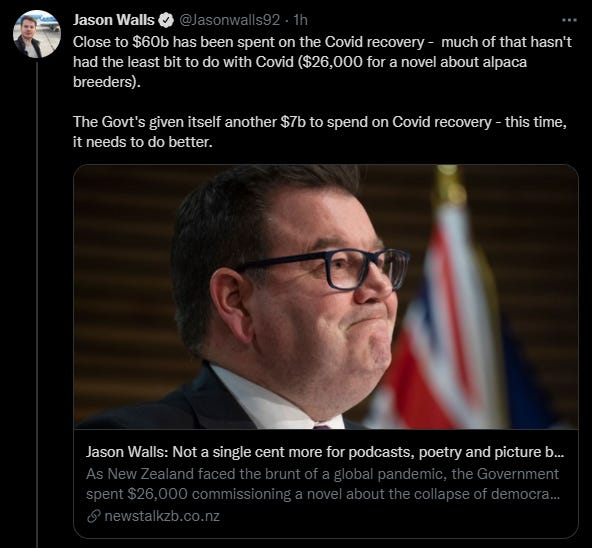
The problem is this, when it comes to much of what passes for opinion writing in our mainstream media: being shitty is the point. These garbage takes and the people who make them are not exceptions: they’re the rule. These cruel, gloating, cherry-picked, conflict-ridden opinions are the result of a concerted, special effort by media owners and producers to produce an endless conveyer belt of shit that will wind people up. Reality – such as the fact that artists have also been affected by the pandemic, or that arts funding is difficult to obtain, and a drop in the bucket compared to, well, nearly everything else that Government pays for – is only occasionally enlisted as a bit player in the endless game of You Won’t Believe How Many Clicks This Gets.
In my opinion, society can’t function well, or at all, when significant parts of its polity view reality at right-angles to each other, actively encouraged by people who profit from conflict and division. That’s why I care about this stuff. There should be a shared commitment from media to make sure that anyone who commands an audience is both a.) doing their best to explain reality as it is, and b.) aren’t being dickheads. I think that’s something most of the public would agree with.
So yeah, here’s the essay.
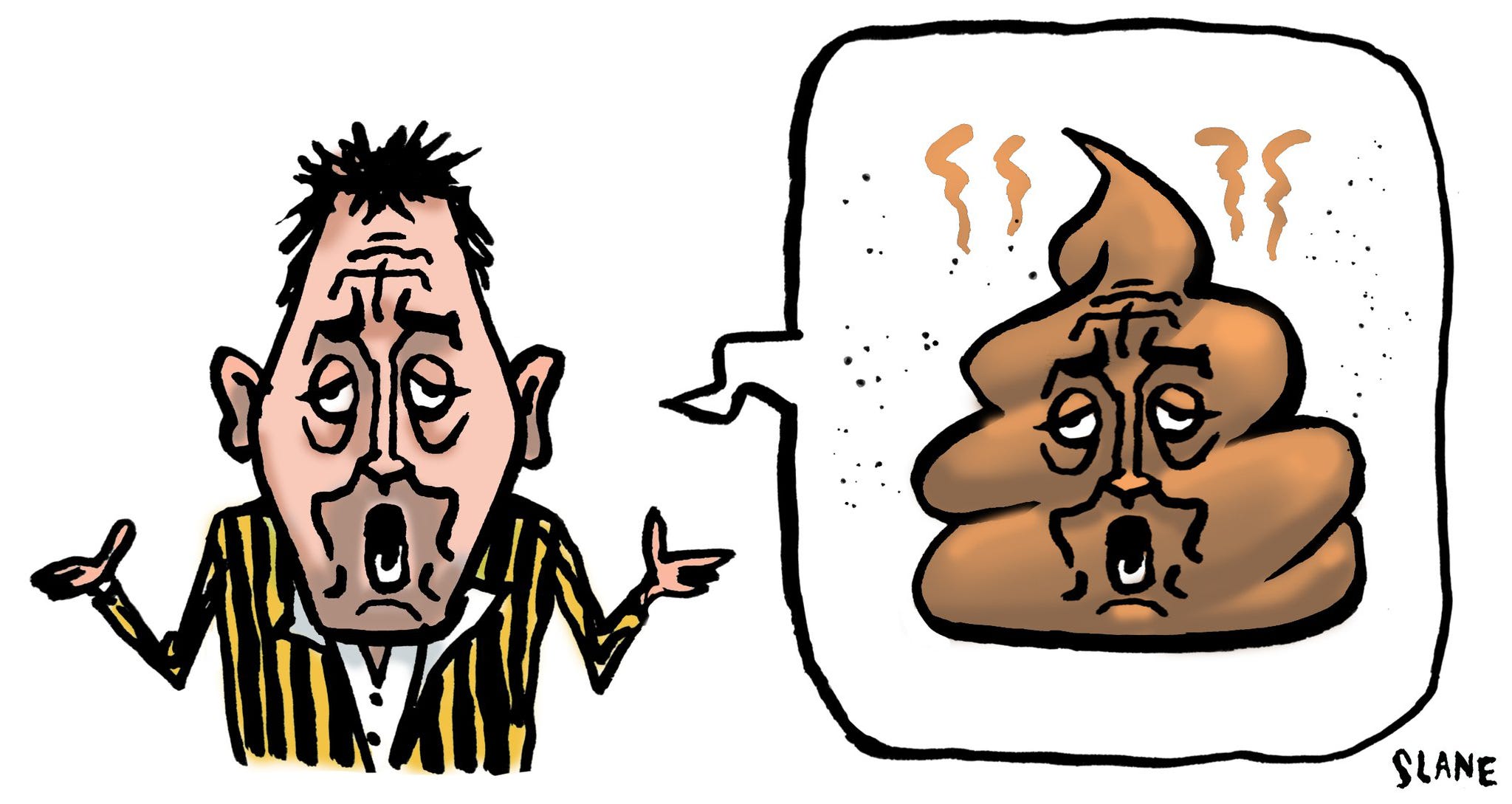
It’s time we fixed the New Zealand news media’s problem with shit speech.
First, let’s put together a working definition. Shit speech is the stuff that might not necessarily be described as hate speech, but it occupies much of the same spectrum. It’s speech that presses the buttons of prejudice, bigotry and outrage, but isn’t necessarily hateful per se; that isn’t (always) lies, but is most often inaccurate, skewed, or otherwise misleading. It’s the floating turd in gutter journalism.
To paraphrase the Broadcasting Standards Authority decision on Heather du Plessis-Allan’s foul commentary about Pasifika nations, it’s speech that is “inflammatory …and [has] the potential to cause widespread harm.” It’s the lower-level stuff in the Pyramid of Hate.
In New Zealand, common topics that shit speech explores include, but are not limited to, immigrants and refugees, the “entitlement” of Maori, LGBTQI issues (callously “debating” the human rights of trans people is the current issue du jour), the “Treaty grievance industry,” and the full spectrum of climate change denial.
Anti-Islam rhetoric used to feature prominently, but for some reason, it hasn’t much lately. I wonder why.
Notably, shit speech is often almost completely devoid of style, substance, wit, or even basic legibility. Mike Hosking’s blithe strawmen frequently contain so little substance that they barely qualify as brain-farts. Leighton Smith is a frequent climate change denier whose only saving grace is writing so inane it’s indistinguishable from the output of an AI trained to generate meaningless text.
So who’s talking shit? As well as the names already checked, and an array of occasional op-ed contributors, it’s Duncan Garner with racist takes on immigrants. It’s Sean Plunket with misogynist references to “feminazis.”
Those are just the ones that come immediately to my mind, but there are plenty more, and not all of them are on the right of politics. I’d also count Chris Trotter and Bomber Bradbury among our stable of shit-talkers, as well as other voices on the Left who seem to glory in stoking conflict. If I’m being honest, I should sometimes include myself among those, from back when I had a regular-ish column, and I thought getting people at each other’s throats was going to in some way help the world.
But the voices on the left don’t tend to have the platform the others do. Not at all coincidentally, many of these personalities overlap with the talk radio and TV broadcasting stable. They are powerful media personalities, with their own shows, who occupy very special safe spaces in New Zealand’s news infrastructure.
This is because these personalities are engineered to generate attention through outrage. Which is ironic, seeing as they’re often accusing others of being outraged snowflakes or virtue-signallers.1 People who love this behaviour signal-boost. So do people who hate it. The behaviour exists because we enable it – and the media personalities’ bosses love them for the attention that we all give out. The feedback loop looks like this:
- Get people to talk shit
- Shit gets engagement
- Profit! (Sort of, as we’ll see.)
- Go to 1
NZME has just implemented a paywall, where they’ll hide their premium content – presumably the excellent work done by the likes of David Fisher, Keith Ng, Kirsty Johnston2, Matt Nippert and many more – behind a weekly subscription. When this was first announced, the words “Mike Hosking” started trending on Twitter – spurred mostly by people begging the Herald to install him behind the paywall, so they didn’t have to hear from him any more.
This won’t happen.3 I’ll bet any amount of money that while quality investigative journalism will tend to disappear behind the paywall, shit speech will continue to dominate the free pages.4 The many people who can’t afford five bucks a week on news will continue to get Mike Hosking & Friends for free, along with all the Daily Mail re-skins they can stomach. So it’s more important than ever that their audience makes it clear that this isn’t actually acceptable.
I’ll get to how this might be done in a bit, but first, some context.
Why shit speech is so compelling to publishers
For news media, it all went comprehensively to shit when advertising became quantifiable. Before online marketing, you couldn’t say for sure if things like TV commercials and newspaper advertising – what we’d now think of as “traditional” advertising – actually worked. The old approach is the equivalent of carpet bombing. A business would spend a great deal of money at an agency, who would produce creative, that would then get placed at further enormous cost as a billboard or full-page ad in the New Zealand Herald or in the ad breaks for One News with John Hawkesby. Ideally, following the media placement, sales would ensue. But you couldn’t always directly attribute the sales to the campaign.
Then Google AdWords and others came along and it became clear quite quickly that, for the most part, the traditional approach was (and mostly still is) absolute balls. Businesses, large and small, flocked to advertising media that could give them a tangible return on investment, and the vehicles of traditional advertising started their long, slow crash.
Which brings us to the present day. Now that big-ticket ad spend and the even more reliable income stream of classified ads is mostly gone,5 one of the last things that online news media has left to sell to advertisers is a flimsy, flawed measure of attention called “engagement.”
In online attention economics, you have a few key metrics that add up to a broader definition of “engagement.” Clicked on a link for the first time? Congrats, you are now a Unique Visitor, and that fact has been recorded somewhere in analytics software. Hung around on the page reading? That’ll clock up your on-page time. Scrolled past a certain point on a page? Clicked a “continue reading” button? That’s measured too. Read the comments? Left a comment? That definitely counts as engagement, and that’s why many news sites cling to comment sections despite overwhelming evidence that, without extensive moderation, they are toxic cesspits comprehensively dominated by cranks and extremists, who drive out moderate voices. It’s also a reason many news sites still have autoplaying videos, despite the fact that audiences hate them. When you scroll past a video as it starts to play and continues to babble away on mute, it still counts as engagement.
The other thing that can be easily tracked and counts towards engagement scores is social media interactions, which, in a sad irony, tend to take place on the same platforms that have so comprehensively bankrupted the news media.
Where that leaves us: Beat journalists are ridiculously overworked, and the meagre funds that publishers set aside to do investigative or otherwise valuable, society-enriching work – like Stuff Circuit, or the Herald’s investigative team – are constantly under threat.
But that’s not all; there’s another, even more insidiously perverse incentive at work. It’s the conflict narrative.
The conflict narrative is something that gets hammered into you at journalism school. It goes something like this:
- Good stories have conflict.
- Good stories get read.
- Therefore, stories should have conflict.
On the surface it seems fairly harmless, but once you dig into the concept a bit you discover a midden of toxic bullshit. This simplistic formula is an excuse for all manner of media evils, the main one of which is false objectivity: Telling Both Sides Of The Story. And it gets worse, because while the impulse to tell good stories or to provide balance comes from a place of good intentions, it’s very easily hacked by bad actors who take advantage of dwindling journalist resources to do their jobs for them.
This is why we so often see the Taxpayer’s Union, which is a laughably obvious front for industry and corporate interests, one that exists solely for the purpose of anti-democratic malfeasance, quoted to provide “balance” to a hard news story about, say, cigarettes or cycleways.
It’s why it’s deemed acceptable to print commentary featuring Both Sides of an issue like climate change, even when one “side” is demonstrably wrong and, very often, intentionally lying.
It’s why, in politics reporting, we get opposing sound-bites instead of policy discussion. It’s why Duncan Garner6 hounds Chloe Swarbrick for a scalp instead of having a proper discussion about the nuances of cannabis law reform.7 It’s why we have the press gallery offering sage reckons about some political happening or other being a “bad look”, offering Machiavellian commentary as if politics was nothing more than an episode of Game of Thrones, instead of the vital mechanism through which government delivers for the people it represents.
The conflict narrative is also a big part of the reason why it’s deemed acceptable for talking heads to intentionally stoke conflict in their op-eds and on the air.
I want to make the point that narrative conflict is not always bad. In many ways, it’s inevitable. Any unpopular truth-telling will incite some conflict, no matter how well-intentioned or carefully put. So will satire and other hard-hitting commentary, punching up at the powerful. All these things are essential.
But there’s a difference between conflict caused from telling the truth, and allowing (or encouraging) your staff to lie, prevaricate, promulgate bigotry, or otherwise stir shit on vital topics in the name of audience engagement. Racist commentary serves no good purpose. Misogynist commentary serves no good purpose. Lying about climate change serve no good purpose.
Making news, instead of reporting it
There’s another feedback loop in the shit-speech ecosystem: the news media having their cake and eating it too. Or, rather, making the news and reporting it too. Here’s a working example: Mike Hosking hates cycleways, and he’s not shy about expressing it in many, many radio rants and (loosely transcribed from radio) columns in the Herald. But the Herald has other columnists and writers, like the excellent Simon Wilson, who use the garbage Hosking produces as fuel for far more considered pieces that politely present the hard evidence for why bikes are actually a bloody good thing in cities.
Now, Simon Wilson’s sort of writing is a good thing, and we need more of it. But it’d be better if he didn’t need to use Mike’s shit, in the same publication, as the launchpad. (Another, more recent example of this cynical content factory in action: Sean Plunket, speaking on Mediaworks’ Magic Talk, on how “woke feminazis” are going to ban rugby. His words are repeated verbatim, with no counter-speech, as clickbait news on Mediaworks’ Newshub website. This then is counterproductively signal boosted – often by people who oppose or seek to mock this sort of misogynistic, paranoid bullshit but just end up smearing it around. When I saw it, it was because some leftie had angrily retweeted it.)
In the Hosking example above, I’ve used cycling as an example, but it if you substitute “cycling” for “climate change” it all gets a bit more fraught. Much of the news media is constantly trying to have it both ways on this, and other important topics; keeping the deniers and cranks onside to preserve conflict, but also presenting the science.
The result is not any kind of balance; it’s a net loss for audiences. The NZME ecosystem is particularly awful for this. The could easily create an editorial line on climate change, as Stuff has laudably done, but instead they allow at least two of their headline columnists to deny and cast doubt on this vitally important matter at every opportunity.
The biggest of all these problems is that shit speech is cheap and it sells. As a product, it’s a no-brainer. For the people trained in producing shit speech, it comes as naturally as pooing. Why spend money on expensive investigative journalism when you could get 10 times the engagement and attention by just throwing a few fresh turds on Facebook?
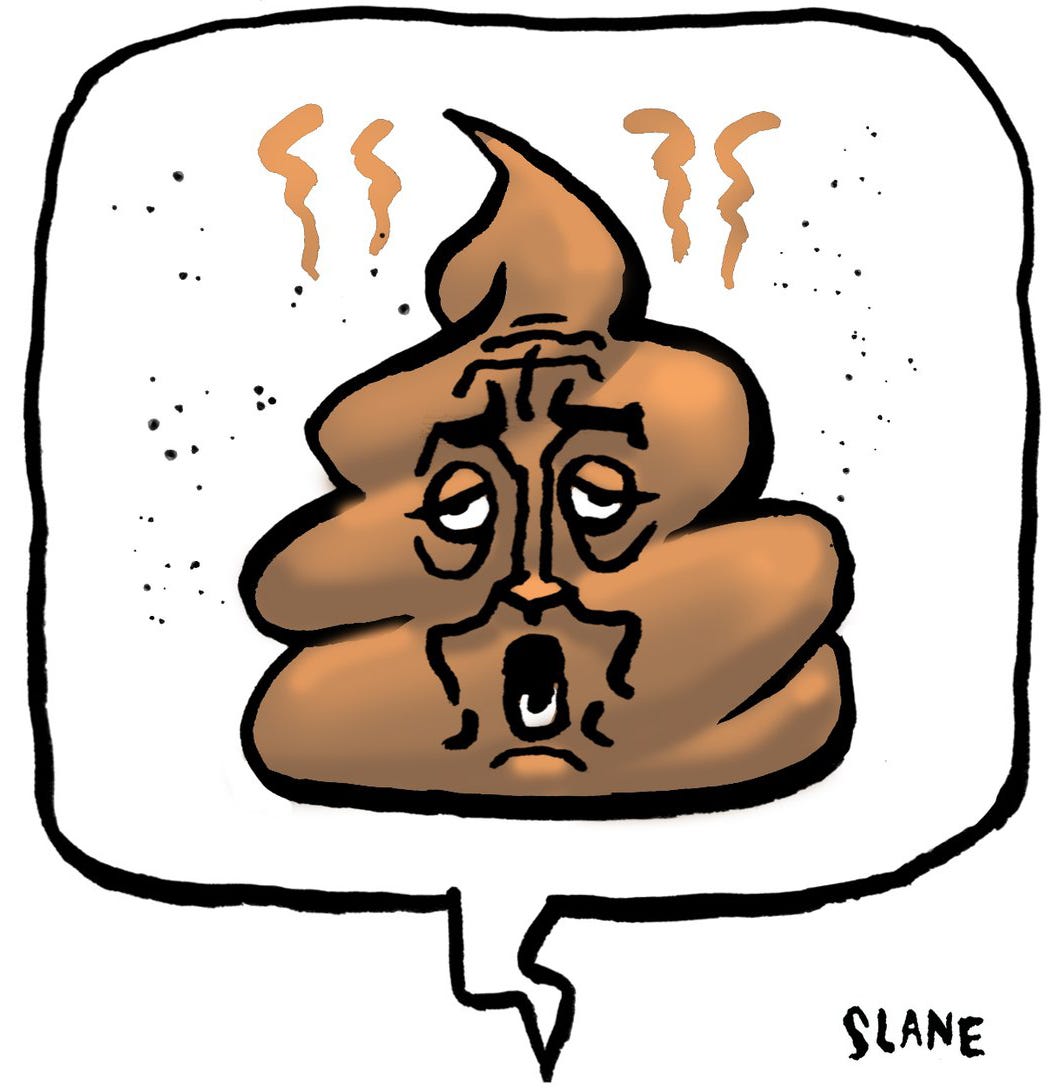
How we can get rid of shit speech
Many of the views espoused by the shit-talkers shouldn’t be on the air. They shouldn’t be in our nationally-syndicated newspaper columns. They are poisoning the well of our discourse, and our society is about ready to die of dysentery. This isn’t a bug; it’s a feature. To cause conflict is what shit speech is for. And it’s not even the shit-talkers’ fault.
This isn’t so much about media personalities or even their politics as much it is about perverse incentives. Most of the people I’ve mentioned are gifted communicators who could do so much better if they tried, or if the incentives supported them to.
The blame for shit speech sits entirely with the people who publish it.
I’ll say it as plainly as I can: if media publishers and editors gave the merest fuck about ethics, we’d wouldn’t have this issue. But we do, and audiences are dealing with it in the wrong way. Every time some new, horrible reckon arrives, instead of ignoring it, we draw attention to it. Well, that’s exactly what publishers want us to do. We won’t rein in Mike Hosking et al’s claim to the shit-speech throne by furiously tweeting their columns every time they say something offensively stupid. Instead, shit speech needs to be deplatformed and ignored.
Here’s how that can be done.
- Lay complaints with regulators
- Note your concerns with advertisers and sponsors
- Hold the editors and publishers accountable
Step 1: Instead of angry-tweeting or rage-posting on Reddit about the latest debacle (including, of course, a link to the offending screed), use your energy to complain to the relevant authorities. First, complain to the editor or producer of the shit-speech in question. If the response is insufficient, then take it to the Broadcasting Standards Authority (for radio and TV) or the New Zealand Media Council (for print and websites.) While a rebuke from either authority still holds some weight in the media, it doesn’t always count for much, which is why I recommend also doing step 2:
Step 2: More effective still is to express your displeasure to the people who sponsor or advertise on the content in question. This is publishing’s Achilles heel. Sure, complain to the harried marketing coordinators running corporate Twitter accounts if you feel like it, but it’s always best to vote with your wallet. You know how many departing customers it would take to make BNZ’s sponsorship of the Mike Hosking Breakfast profoundly unprofitable? Not bloody many.
So if, like me, you are furious at NZME encouraging Mike Hosking and Leighton Smith’s8 endless prevarication on climate change, you might want to take it up with the sponsors, and make sure that people who feel the same way are ready to do the same thing. If their scant margins are threatened, publishers will drop shit-stirring broadcasters like hot turds. We’ve seen this happen many times before, not least with John Tamihere during the Roastbusters scandal. (Of course, he’s running for Auckland Mayor now, which to me is just another example of the shit-speech Ouroboros in action.9) In fact, that’s actually a neat summary of the issue: the personalities themselves are not really the problem. The platforms are. If Mike Hosking was drummed out of his media tomorrow, another shit-stirrer would pop up to take his place, because that’s how the incentives are set up. So, to me, step 3 is the most important:
Step 3. Hold publishers and editors accountable. Don’t ever complain to the news personalities who generate the awful opinions you hate so much, because that’s what they’re paid to do. Ignore them. Go straight to the publishers. Complain to the editor. Tweet at the publishers. Make sure you’re letting them know that you know what they’re up to, and that it’s not good enough. Inform them that you’re talking to their sponsors, that you’re calling advertisers. For some reason, a lot of people who set themselves up as free speech defenders for foreign fascists hate this sort of behaviour, but sadly for them, this is free speech and freedom of choice in action, and you should wield this powerful weapon as best you can. Oh, and if you absolutely must link to examples of shit speech to make a point, don’t reward the sites hosting it with a direct link. Take a screenshot, or use a service like Pastebin instead.
And here’s my final suggestion for defeating shit speech: pay for news. If you can afford it, sign up for the Herald’s new paywall. Join the Spinoff Members. Click the Press Patron button on Public Address.
“Wait,” I can imagine you thinking, “you’ve just shelled out around 2000 overwrought words telling us what a shit-show the news media is through the powerful medium of poo metaphors. Now you want me to literally give them money?”
Yes, and here’s why.
For all the gross excesses of conflict-milking and shit speech promotion by media companies, going after “engagement” is a losing game.
Proper journalism doesn’t have much of a place in this economy. Of course, it never really did. Excepting the extremely weird and endangered animal of state-owned media in liberal democracies, a lot of the news only ever really existed as a reason for customers to purchase reams of classified ads. Clickbait and shit speech has always been with us. The incentives were perverse from the start, and now they’re just more so.
However, if you pay for your news with real money rather than nebulous “engagement”, you become an actual customer, a true stakeholder.10 This is important. For all the pitfalls of the news media, and despite the best efforts of unethical publishers, journalism – real journalism – is more important than ever before.
We need people who will find important things out and tell us the truth about what is happening in the world. In my opinion, while I think it’s far better for society for real news to be available for free, paying directly for good journalism is what might secure its future. It removes some of the pressure to create cheap engagement through outrage. Instead, you can show that you value real news, and a diversity of well-framed opinion that doesn’t cause conflict simply for the sake of engagement. And if you don’t like what your paid news source is up to, well, opting to withdraw your custom speaks much louder than an angry retweet.
This whole long thing has been an exhortation to stop signal-boosting shit speech, but I’d like to end it with a call to promote well-considered, positive speech from new, diverse voices that might otherwise get drowned out by all the shouting.11
If we, the audience, can show news publishers that shit speech isn’t what we want, it increases the odds that they’ll start serving up some proper good shit instead.
Since I wrote this, what’s changed? A few of the commentators I namechecked have departed media, possibly permanently, probably temporarily. Sean Plunket alleges that pressure from advertisers played a role in his departure from MagicTalk, which, if true, is a clear-cut case of advertiser influence being perhaps the only authority that media ultimately bows to.
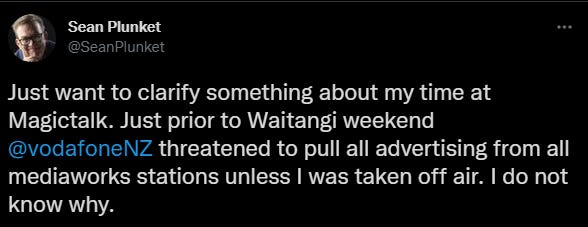
“I do not know why.” Everyone else does, though. On balance, I’m not sure this is a good thing. If advertiser pressure is the only effective lever the public has to pull when it comes to bad media behaviour, that’s less than ideal, as it’s easy to see it used against publishers of inconvenient truths rather than blathering bad-take factories. A comprehensive and properly enforced code of ethics, one that covers opinion instead of explicitly leaving it out, would be far preferable.
But until that day comes, if it ever does, it looks like the only way to hold media to any kind of account will be via their purse-strings.
I want to say a huge thanks to Chris Slane, one of NZ’s best cartoonists, who did the brilliant illustration for this reissued essay. Find him on Twitter here and commission some work from him ASAP.
-
I think it’s telling how quickly and enthusiastically many, almost exclusively on the right of politics, have adopted the creepy, hateful language of Gamergaters, Trumpers, and the alt-right, and are now bemoaning the “woke.” ↩
-
Johnston has since moved to Stuff. ↩
-
It didn’t happen. ↩
-
This did happen. ↩
-
For all the wailing about Google and Facebook, classified ads are how newspapers used to make most of their money, and that lunch got cut first by eBay and TradeMe. ↩
-
Duncan Garner has since departed the AM Show, having mysteriously decided after years of early morning starts that he doesn’t like early morning starts. ↩
-
This aged well/badly – the cannabis reform referendum very narrowly failed, and I think the terrible, conflict-driven media narratives at the time, and the way this was gamed by powerful lobbying interests, played a big part in this. I assume a study will come out on it in the next decade. ↩
-
Leighton Smith has since retired from live radio. Don’t worry! You can still hear his weekly reckons on the Leighton Smith Podcast. Thanks, NZME! ↩
-
He didn’t win, but it’s only a matter of time until someone else from the wonderful world of reactionary right-wing media reckons has a hoon at politics. I reckon it’ll be Mark Richardson. Place your bets now! ↩
-
I am less optimistic about this now than I was when I wrote it, and to be honest I was kind of forcing the optimism even back then 😭 ↩
-
If you don’t want to support a media behemoth that happily engages in conflict-for-clicks, you could subscribe to someone’s Patreon, or *cough* Substack newsletter. ↩
It’s 2021, and the NZ news media is still doing climate change denial
The Spinoff’s Bulletin newsletter is always a banger, and the one that came hot on the heels of the IPCC’s catchily-named Sixth Assessment Report was no exception. The roundup was excellent, linking to a number of concise, accurate commentaries detailing the key points in the report.
The problem was this bit I’ve highlighted.

To be clear, I think the Bulletin is great and that you should subscribe immediately. Author Alex Brae1 has the difficult job of pulling together a good chunk of the news that’s fit to print over the course of 24 hours and he does it very well. If you want to be informed, you could do much worse than the Bulletin. I read it every day.
But I’d argue that “if you’ve read any reputable news publication for any length of time, the certainty of climate change will not be in any doubt” is flat-out wrong.
Why? Because New Zealand mainstream media has consistently platformed climate change denial of all kinds, from denial-lite “sure, it’s happening, but we should probably just carry on as normal” to full-blown “not happening, not us.” (For the full spectrum of denial, here’s a cheat sheet I sketched up a while back.)
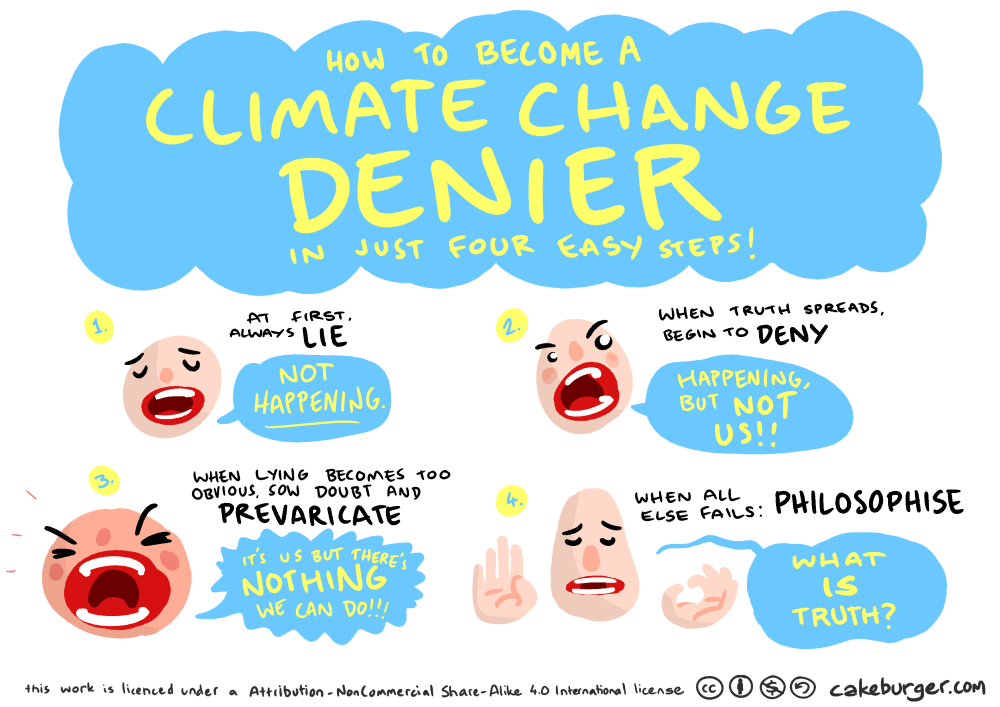
The news media promulgates climate change denial in a number of ways, including but not limited to:
1. False equivalence
While climate science is virtually unanimous when it comes to the scientific verdict – which is, broadly climate change is real, it’s happening, it’s us, it’s bad, but it’s not too late to act – the media frequently act as if facts themselves were up for eternal debate. This is great for juicy conflict-filled stories but less good for the facts themselves. This trend is often seen in talking-head shows when, instead of representing the overwhelming scientific consensus, they bring on two people – typically a denier and someone picked to represent the institution of science in general – who get to yell at each other. John Oliver did a really funny bit about it.
Outside of TV-land, publications frequently resort to a weak pastiche of objectivity, like this sterling effort from the New Zealand Herald, utilising the he-said, she-said style so “the reader can to make up their own mind.”

This, too, offers reality as a matter for debate, with denier claims treated as equal to the science. Media could quite easily either a.) choose not to cover climate grifters at all or b.) use editorial judgement to debunk denier claims right in the news article, but they frequently do neither.
2. Gifting grifting deniers a platform
While it’s now rarer to see out-and-out climate change denial in the opinion pages of our nation’s mastheads (and kudos to Stuff who, since their management buyout, have adopted editorial policies against climate change denial and literally have an entire section of their website devoted to climate reporting) it’s still frequently happening.
Here’s the Herald again, giving space to the self-styled “sceptical environmentalist,” well-known climate grifter Bjorn Lomborg:
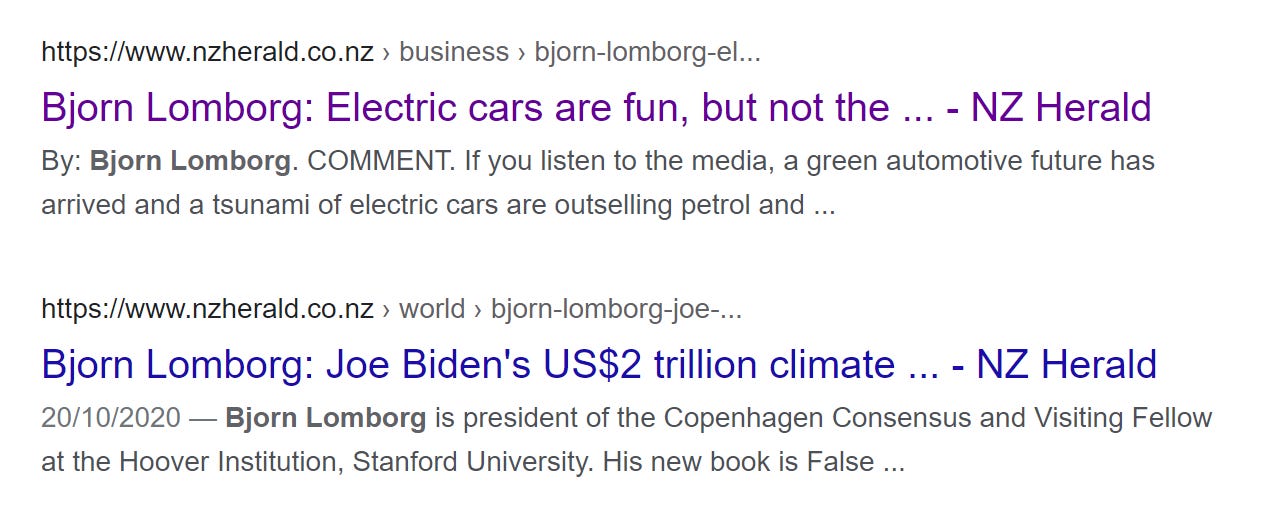
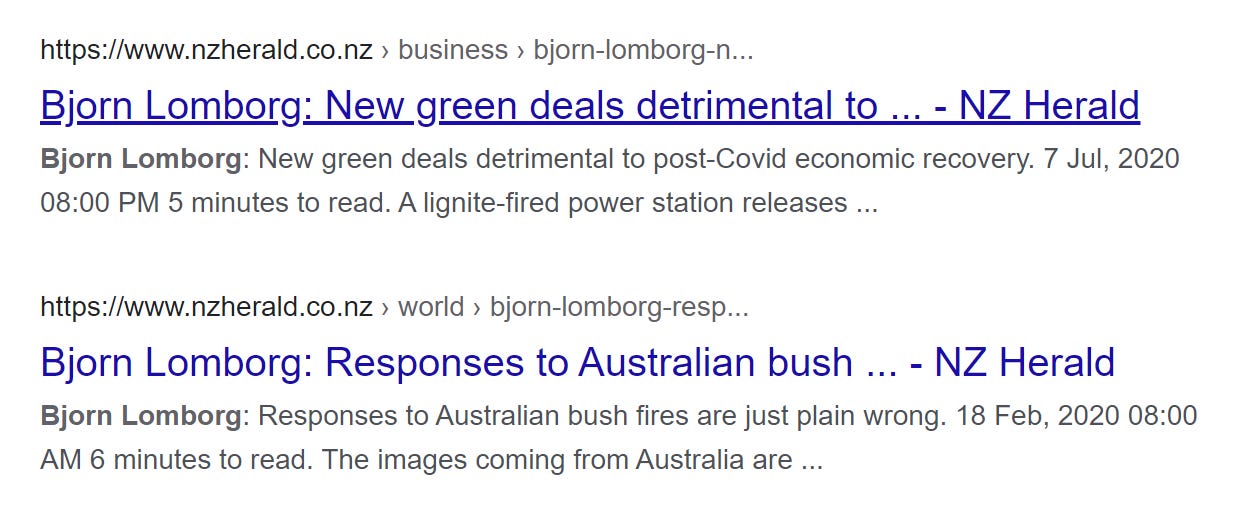
Lomborg, who has no climate science qualifications and who has been debunked by those that do, is a frequent guest of the Herald, which I’m assuming is one of the reputable outlets that Alex talks about.
When an publication offers a platform to deniers, it undermines all the good work that their news teams or editorial staff might also be doing, and rather than informing readers about the facts, it allows them to cherry-pick their reality to suit an existing worldview – “I read it in the Herald, this guy Lomberg is an environmentalist, and even he says climate change is no big deal!”
But, you say, that’s the Herald, and luckily we have other publications like The Spinoff that don’t… oh.
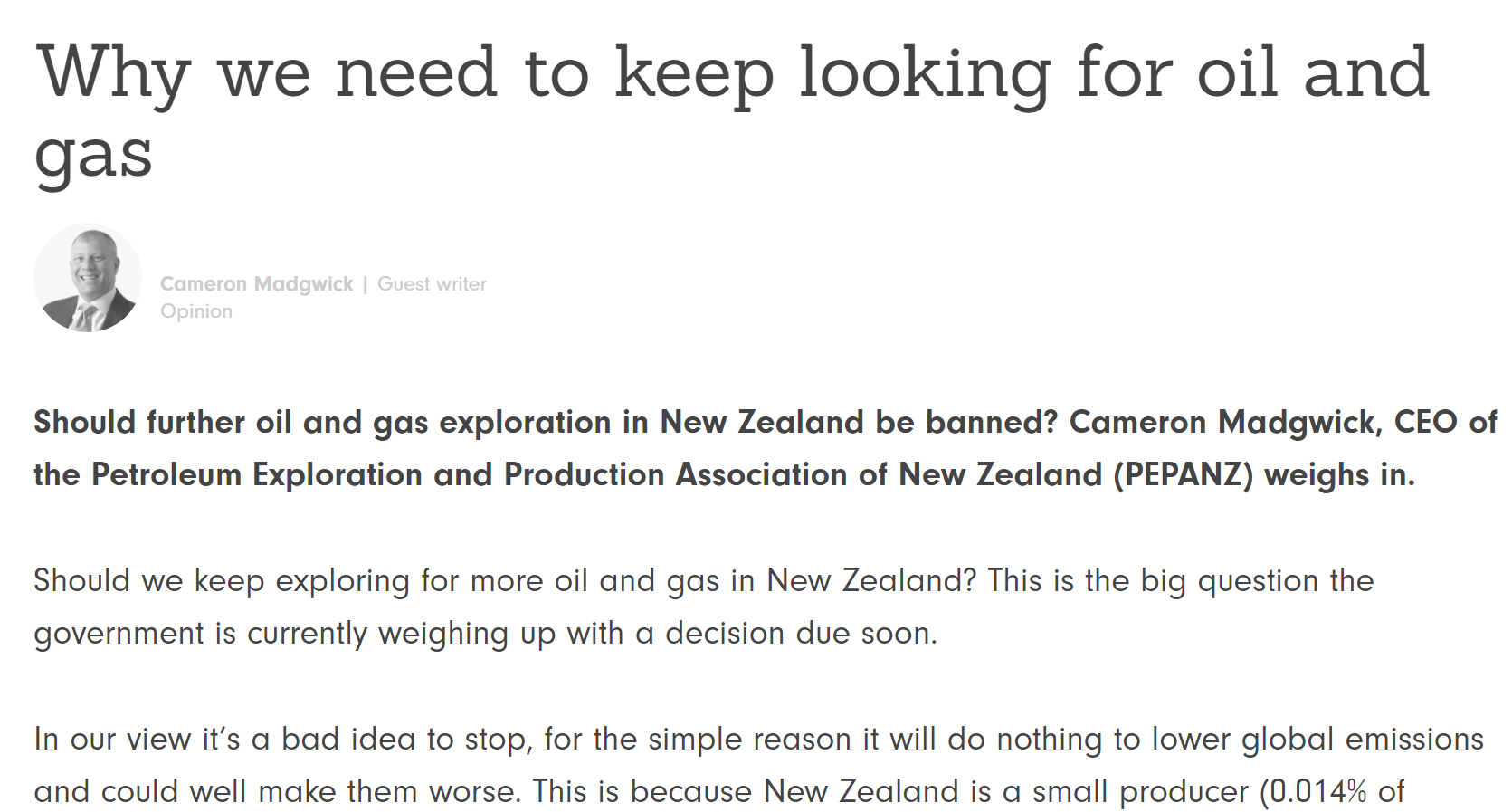
Ah well, at least the excellent Bulletin isn’t potentially compromised by fossil fuel interests… oh.

Again; I genuinely think the Bulletin is great and that you should subscribe to it, and I am absolutely not suggesting that the Bulletin’s content is in any way influenced by its sponsor (history and firm editorial policy suggests that it’s not) but it’s a timely reminder that, no matter how correct their line on climate change, there are very few sectors of the media that can claim to be free of fossil fuel money, if not influence.
3. Implausible deniability
By now it should be fairly clear that reputable mainstream news publications very much don’t offer certainty when it comes to the facts on climate change. In fact, by offering deniers a platform and elevating denial to the same stage as actual evidence, they do quite the opposite. I’d suggest that most lay climate change doubters and deniers find themselves in that position because they’ve been mislead through a selective reading of mainstream media, which is a great gateway drug to the endless mire of climate misinformation available on the internet.
But why go on the internet when you can get shit like this on the radio?
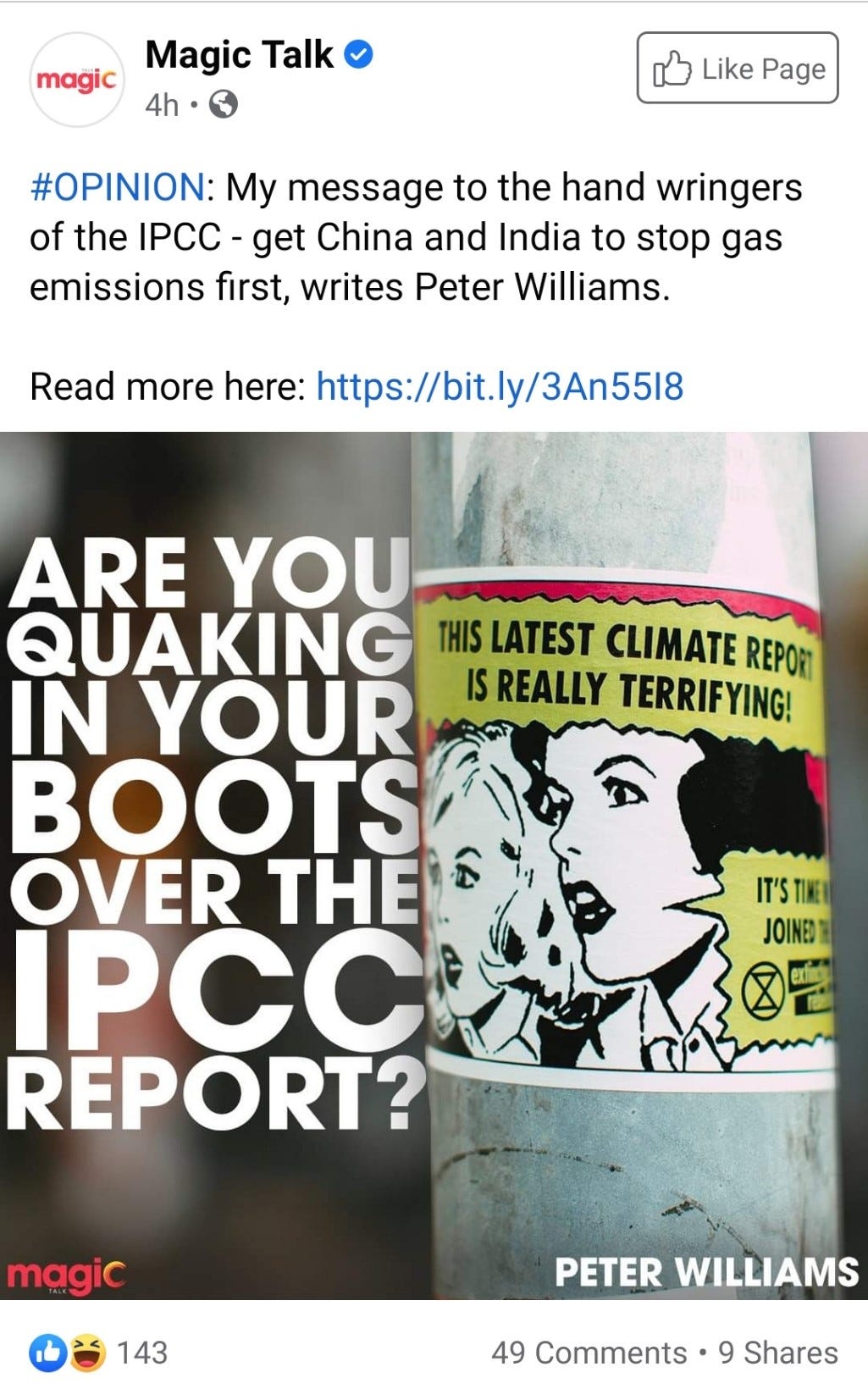
Peter Williams is a long-time climate change denier, who’s been given what seems like a permanent platform on Magic Talk Radio, owned by Mediaworks. If you want to see the sort of effect this stuff has on audiences, just check out the comments.

But that’s talkback, a noted cesspool of terrible reckons, a medium that pretends to challenge its audience but mostly just coddles them. It’s not reputable, is it? Well, for the verdict on that, let’s ask NZ’s biggest broadcaster for the last decade or so, Mike Hosking.

Hmm. But that’s Newstalk ZB. A reputable publication would never engage in this sort of… oh.
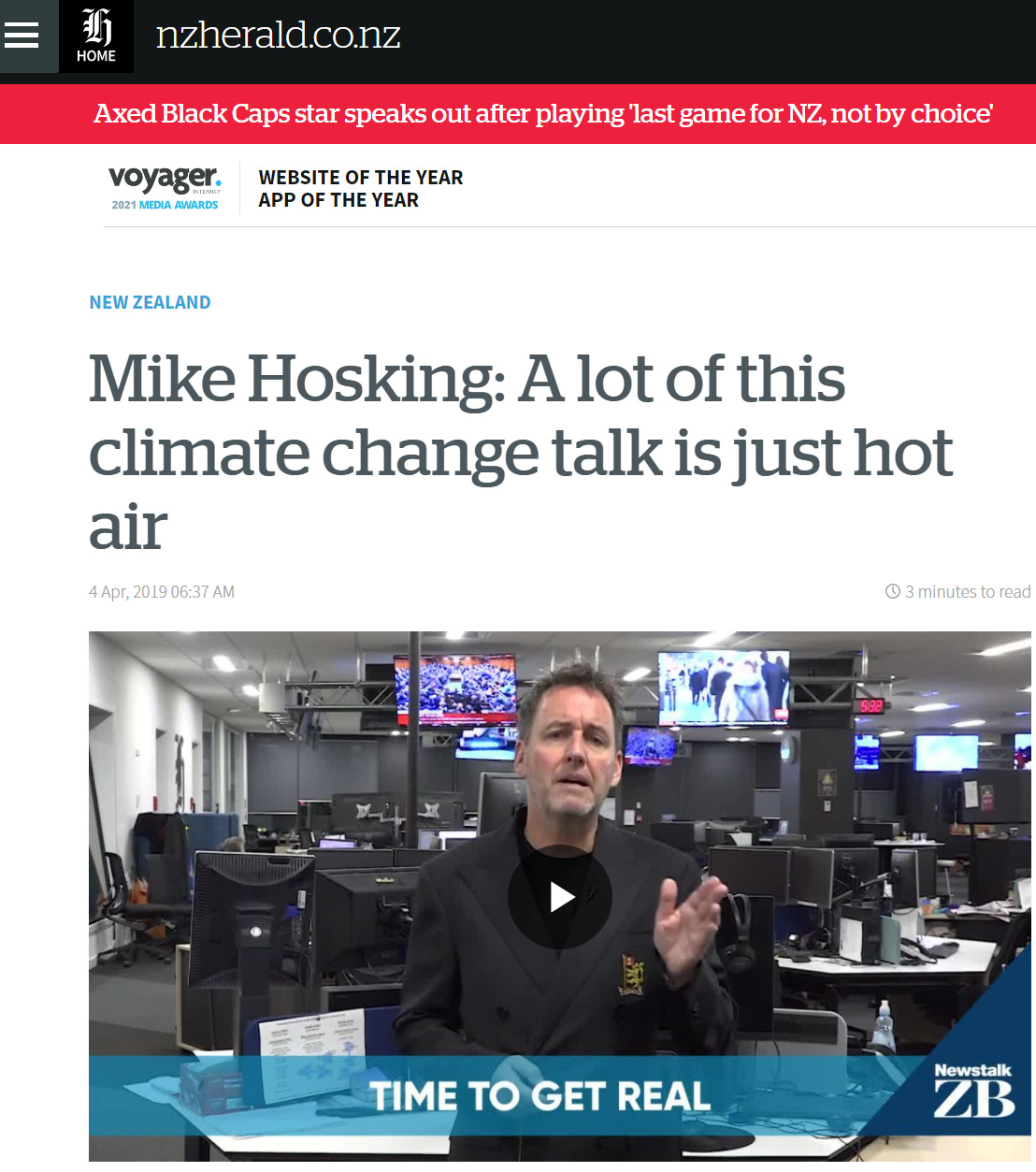
It’s important to note that, any appearances to the contrary, the Herald and Newstalk ZB are essentially the same publication. They share an owner (NZME), they share content, and they share an editorial position, which – too frequently – is that the reality of climate change is up for debate. Much of the rest of the news media still share that view.
It’s not true. As the Bulletin admirably points out, climate change denial is lies, promulgated in the media mainly by paid shills and useful idiots. If news media wants to remain reputable, or regain its reputation, perhaps it’s time publishers pledged to stop promoting climate change denial altogether.
Thoughts? Reckon it’s about time the news media pledged not to engage in climate change denial? Let me know what you reckon in the comments. In the unlikely event that anyone feels like getting into some climate change denial, I just won’t publish it! See how easy that was, New Zealand news media?
If you liked what you read here, you can help out by sharing this post (it’s free!) or by subscribing. This newsletter has had a slow start – who knew a baby would be so much work! – but now I’ve got a bit of content backed up and ready to go, so you can anticipate more frequent updates in future.
I’m also going to turn on paid subscriptions, just as an experiment – for the moment, the newsletter will stay free. If you choose to contribute, I really appreciate it – it would be amazing to turn this little newsletter into a going concern. Plus, I have some (extremely cool) contributors lined up, and it’d be nice to be able to pay them for their work!
-
Since this newsletter ass published, Alex has left, and he’s much missed. The Bulletin is still good, tho, and now features (mercifully) less cricket. ↩
-
Talkback radio’s racism is a feature, not a bug
People all over New Zealand are in shock at the news that someone said something racist on talkback radio.
The shock, of course, mainly comes from the fact that there have been actual consequences for saying something racist on talkback, which is a medium that exists more or less for the express purpose of fomenting listenership by either a) being racist or b) getting racists to call up and be racist on the air.

John Banks, former National MP, former ACT leader, former Auckland Mayor (twice), and now former broadcaster, has a long history of saying racist stuff on radio, and of failing upwards. Of course, it’s not done to say the quiet part too loud, which Magic Talk host John Banks did when he let a racist caller ramble at length about how Māori were a “stone age people,” and then followed up with his own recurring racist fantasy about Māori people coming in through windows. (He has form: the ex-MP has been on the air since 1992, and in 1995 caused controversy by having then-MP John Carter call in and pretend to be a Māori man called “Hone.”)
Instead of being overt, talkback racism is meant to be expressed at a constant high-pitched whine, in the form of “debate.” Listeners to Magic Talk and other talkback radio stations have long enjoyed being able to tune in and hear the humanity and rights of various non-white races debated or denied at length. Sometimes, just to mix things up, there’s also climate change denial. Consequences vary, but most often take the form of a damp caress on the wrist by the Broadcasting Standards Authority, who are a Government-mandated manufacturer of wet bus tickets. Instances I can remember off the top of my head include:
That one time Heather du Plessis-Allan called the Pacific Islands “leeches” (Newstalk ZB, NZME, BSA complaint upheld.)
I mean, it’s the Pacific Islands. What are we going to get out of them? They are nothing but leeches on us. I mean, the Pacific Islands want money from us. We don’t need money from them
That one time in 2019 when Andrew Dickens asked a caller “How Māori are you?” (Newstalk ZB, NZME, BSA complaint denied)
How Māori are you? Because unfortunately we actually put a numerical value on it, whether you’re you know, umm a half, a quarter, an eighth, a sixteenth, a thirty-second
That one time in 2020 when Sean Plunket, according to the BSA, “amplified racism, misinformed listeners, ridiculed Te Tiriti and was insulting to Te Whānau ā Apanui,” by being rancidly racist about Iwi roadblocks. (MagicTalk, MediaWorks, BSA complaint upheld)
“It’s all about separatism, folks. It’s all about that Treaty and that spirit of partnership and making up a whole lot of rules cause it makes you feel good. Weird.”
(This shebang was made considerably more awkward by the fact that Sean Plunket actually served on the BSA, for about five minutes, before quitting over a controversy where he tweeted about feeling pity for Harvey Weinstein. Also, Sean Plunket has been airing his concerns about iwi roadblocks again, which seem to be a perennial topic of interest for him! I wonder why?)
Anyway. I picked those incidents more or less at random. There are dozens more I can think of, and the only reason there aren’t many more is because these incidents are when people actually made BSA complaints. It’s like racist trees falling in forests: we usually only hear about it when someone takes the trouble to navigate the BSA’s unnecessarily byzantine complaints process.
Of course, the real problem isn’t just the presenters. It’s the system that perpetuates them. In talkback, horrible presenters with endlessly bad and often racist takes aren’t the exception, they’re the rule. They’re a feature, not a bug. They’re the point. In MediaWorks’ own words, in one of the BSA decisions that went against them:
Sean Plunket has a long history as a broadcaster and is well known for his often provocative and adversarial style of broadcasting. We also note that the BSA recognises talkback generally as an opinionated environment that it is given latitude to be provocative and edgy to provoke debate.
To which I say, lol, no, you disingenuous, sanctimonious polluters of the national discourse. It’s not about debate. It’s not about being ‘edgy’. Talkback stations exist to pander to their audiences (and occasionally wind up those who find prejudice offensive) not to challenge them. It’s about as edgy as a sphere. Actual edgy / provocative content, when it comes to the talkback audience, might look like:
- Suggesting that workers seize the means of production
- Encouraging the redistribution of the wealth taken by billionaires
- Implying that Māori have rights as tangata whenua
- Saying that building cycle lanes is good actually
- Admitting that climate change exists
So, while we can mostly all agree that racist presenters are terrible, the focus really needs to be on the organisations that give them a platform and encourage their racist behaviour. Their reasons for doing this aren’t necessarily that they’re run by closet racists; it’s just that “they’re just saying what everyone thinks!”-style racism is popular and easily monetised.
When it comes to NZME (owners of Newstalk ZB and the New Zealand Herald) and MediaWorks (owners of MagicTalk, former owners of Three) their radio divisions share a very rare trait in this media environment: they are actually profitable. Talkback has been bleeding into other media formats for ages, even as other media formats copy talkback’s successful mechanisms. This is why the talkback stable is so prominent in the other bits of the media that these companies own; it’s why Mike Hosking and Heather du du Plessis-Allan are in the Herald every twenty seconds, and why blowhard hosts like Duncan Garner have regular columns and guest spots in apparently every major media outlet in the country. They foment conflict, which becomes news, which creates blowback, which becomes news, and so on ad infinitum. I wrote about this problem back in 2019 and honestly it’s only gotten worse since then.
The good news is that the talkback stations’ cash-cow status actually makes the big media companies incredibly vulnerable to activism. If the public expects its Fourth Estate to consist of actual journalism and not racist buffoons, we can do something about it. Moreover, there’s no good reason why talkback radio has to be racist, sexist, conspiracist, or any other bad “ist.” It could be a well-moderated space where ordinary people get a chance to air their views. But to become that, it has to change, and change fast.
Vodafone, Spark and other organisations sensibly pulled their advertising from MagicTalk in the wake of the latest controversy, citing incompatibility with their values. They’re right. But I expect advertising will quietly resume at some point in the future once this particular controversy has blown over, at least until the next one comes along.
This shouldn’t be allowed to happen. Companies that take their values seriously should not be advertising on talkback, in its current form, at all. In fact, if they truly mean what they say, they should withdraw advertising from not just talkback but the parent companies. If Newstalk ZB is engaging in climate change denial, then yank advertising spend from all NZME properties, including the New Zealand Herald and One Roof. If MagicTalk is racist, then pull your ads off Mediaworks, including QMS billboards and The Edge. The parent company is setting the agenda for their media properties, and they should bear the ultimate responsibility for the content that airs on their networks. They’re not discrete entities. The Herald, to all intents and purposes, is Newstalk ZB.
So, if you’re mad as hell and aren’t going to take it anymore, by all means, complain to the toothless BSA when someone says something terrible, and wait for the broadcaster to either be let off the hook or be hit with a paltry $3000 fine, but you’ll do much better complaining to the advertisers. Broadcasters don’t really care about BSA rulings or fines. In fact, they often welcome them. It means their audience is engaged and, as the controversy breaks into other media, it guarantees them more attention. But if their source of revenue starts leaving, they freak out – and their revenue sources will leave, if encouraged to, because most of the big corporations who advertise on radio are risk-averse and hate being attached to controversy. I genuinely believe it’s the only way for these media organisations to change.
I’m not the only one thinking along these lines, of course, and because I’m a slow writer with a day job and a new baby, a bunch of people have beaten me to the punch. Duncan Grieve at the Spinoff has a sharp analysis that comes to pretty similar conclusions to this piece, and David Farrier goes into great, angry detail about past instances of racism on talkback. There seems to be consensus building that it’s time talkback admitted its role in fomenting racism, and ditched the divisive model.
What could come next? How about: a crowdsourced list of advertisers on talkback stations? People who volunteer to listen to and record the stations to catch every terrible thing they say, who post the proof on social media, and who complain to the advertisers?* How’s that for edgy, MagicTalk?
Or, the media bosses could themselves save money and trouble, finally call time on racism, and install hosts who aren’t massive dickheads. They could tell these hosts to stop giving a platform to racist grifters and cut off callers who spout racist nonsense.
I’m thinking the first course of action is more likely, mainly because MediaWorks’ CEO’s response to the latest instance of rampant racism in the organisation he runs is, absurdly, to deny that there is any:
Cam Wallace, CEO of Mediaworks, finds no evidence of racism at Magic Radio. Here you go Cam.
— Luke Fitzmaurice (@FitzmauriceLuke) 10:38 PM ∙ Jan 27, 2021
Clearly, something needs to change. When it comes to mass media, New Zealand doesn’t just deserve better: we desperately need it. I’m keen to hear ideas, so feel free to kick off in the comments, or on Twitter, or wherever. Let’s actually have the provocative, robust debate talkback loves to pretend it has, without being racist loons. Can’t be that hard, right?
*God, what a job that’ll be. Someone’s gotta do it, though. The volunteers will be remembered as heroes of the Culture Wars.
Chris Liddell: the NZ news media is not your laundromat
It’s not a good time to be associated with Donald Trump, and so it’s probably not a good time to be White House Deputy Chief of Staff Chris Liddell.
But that hasn’t stopped the New Zealand news media from — wittingly or unwittingly — helping one of Donald Trump’s top lieutenants in his attempt to scrub his reputation clean from the fallout of Trump’s disastrous presidency.
What’s going on here? And why would journalists and media publications opt to help someone who’s spent the last four years aiding and abetting a man who could charitably be described as the worst modern US president, and uncharitably (and accurately) as a fascist, would-be demagogue?
Well, most journalists probably aren’t thinking about it that way. In all likelihood, they’re just doing their jobs, trying to get a scoop on a guy who’s newsworthy for very good reasons. But the fact remains that, by being unguarded about how they report on Chris Liddell, our news media runs the risk of helping him launder his reputation.
But before we dive into that, we’d best go through some history.
Who is Chris Liddell, and why does it matter?
A former investment banker, Liddell’s CV reads like a laundry list of corporate climbing: he was CEO of building materials supplier Carter Holt Harvey (circa the leaky homes crisis), CFO of Microsoft, Vice Chairman of General Motors, and Chairman of Xero. He was also active in US politics, on the Republican side: he worked for the 2012 Romney presidential campaign as the executive director of transition planning, and director and treasurer of the Romney for President campaign.
Of course, when you’re already one of the world’s most powerful people, other powerful people just kind of give you more power. While still working as Xero chairman, Liddell was shoulder-tapped for the position of “Assistant to the President for Strategic Initiatives” in the Trump administration. What this nebulous position was actually for, no-one seems to know, but unlike many other Trump administration members who quickly resigned or found themselves fired, Liddell hung around for a full four years, climbing as always. Today he rejoices in the lofty title of White House Deputy Chief of Staff, a role that reportedly entails daily contact with the President. Notably, he also serves as a member of the president’s Coronavirus Task Force. In a further success, in October 2020, Trump nominated him to be Secretary General of the OECD, which immediately attracted controversy — and a flurry of opinions from New Zealand media figures. We’ll come back to those soon.
The end of history
On January 6, 2021 a mob, directly incited by Donald Trump, stormed the US Capitol. The world watched in horror. The reaction was swift: within 24 hours Trump was being repudiated by most former allies and enemies alike, and was banned by nearly every major social network from Twitter and Facebook to Pinterest and Pornhub. (At the time of writing, YouTube remains a hold-out.)
Around this time, it’s likely that Chris Liddell realised that a plumb job as head of one of the world’s most influential bodies, or any job at all, might now not be that easy to come by, and decided some reputation management was in order.
A mere two days after the failed insurrection, Jonathan Milne, an editor at New Zealand news site Newsroom, saw fit to publish an article that could easily become a cornerstone of Liddell’s reputation laundering effort.
The Newsroom article fails to mention any of the multiple controversies and outrages (Muslim bans, kids in cages, the coronavirus catastrophe, to name just the ones that spring to mind) that Liddell was undoubtedly privy to as a member of the Trump administration. There is no particular indication given in the article that Liddell was asked about any of them. The closest it comes is this bit:

Of course. Liddell is doing the honourable thing. He’s staying on to help the transition to the Biden administration! Sure, he could have quit at any time, and he thought about leaving, but he can’t do that now!

Journalism of this type often tries to tiptoe the line of objectivity, but that’s not what’s going on here. If the article had left readers wondering what Milne really thought, it wouldn’t matter, because he took the time to tweet it right out:
I spoke to Chris Liddell today about his decision to stay and serve the last days of the Trump Administration. I’ll put this out here: I think he’s right to complete his job managing an “orderly” transition; jumping ship now would be too easy. @NewsroomNZ
— Jonathan Milne (@JonoMilne) 9:00 AM ∙ Jan 8, 2021
The New Zealand Herald also published an article along similar lines, by NZME’s Head of Business, Fran O’Sullivan. However, unlike Milne, O’Sullivan has been a frequent Liddell booster: just witness this worshipful hagiography (mercifully paywalled) where she pats herself on the back for her foresight in a 2017 think-piece she wrote about Liddell’s appointment, while also quoting herself at length:
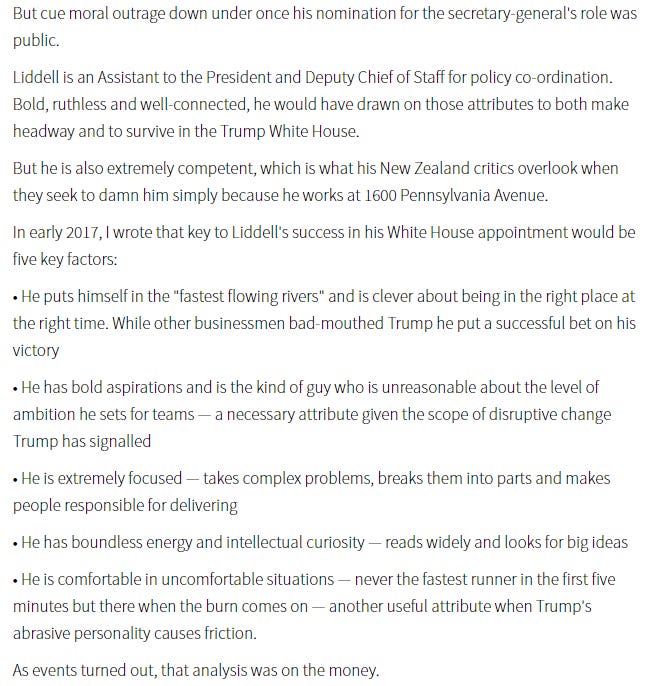
Here’s the fun part: O’Sullivan wrote that in October 2020, before Trump’s election loss, his refusal to concede, and the storming of the Capitol, but well after the administration’s many other crimes were extremely public knowledge.
Here’s a thought, O’Sullivan: perhaps the reason for the “moral outrage” aimed at Liddell is because the act of serving in the administration of a cruel despot is inherently morally outrageous, no matter how good he might be at hurling himself into the fastest-flowing river while simultaneously performing all seven habits of highly effective people? When the “scope of disruptive change” that Trump’s administration (not just Trump himself!) enacted includes separating refugee children from their parents (and subsequently losing track of them), attempting to ban members of an entire religion from entering the United States, and killing tens of thousands of Americans with a world-beatingly incompetent response to a pandemic?
Here’s the thing: if you look a bit past Milne’s editorialising and O’Sullivan’s overt fandom, it seems clear that Liddell’s actions are not those of a man laser-focused on doing the best possible handover to the Biden administration. Rather, they appear to be those of a guy flailing wildly to restore his reputation before it bottoms out somewhere near the Earth’s molten core. We know this because Liddell (in addition to taking calls from journalists at this busy, busy time) has engaged PR firm SweenyVesty to broker interviews.
Lobbyist and NZ Herald columnist Matthew Hooton, who has been vocal in recent days for the need for former Trump administration officials to be held accountable for their misdeeds, has put his account up on Facebook, and it makes for unsettling reading:
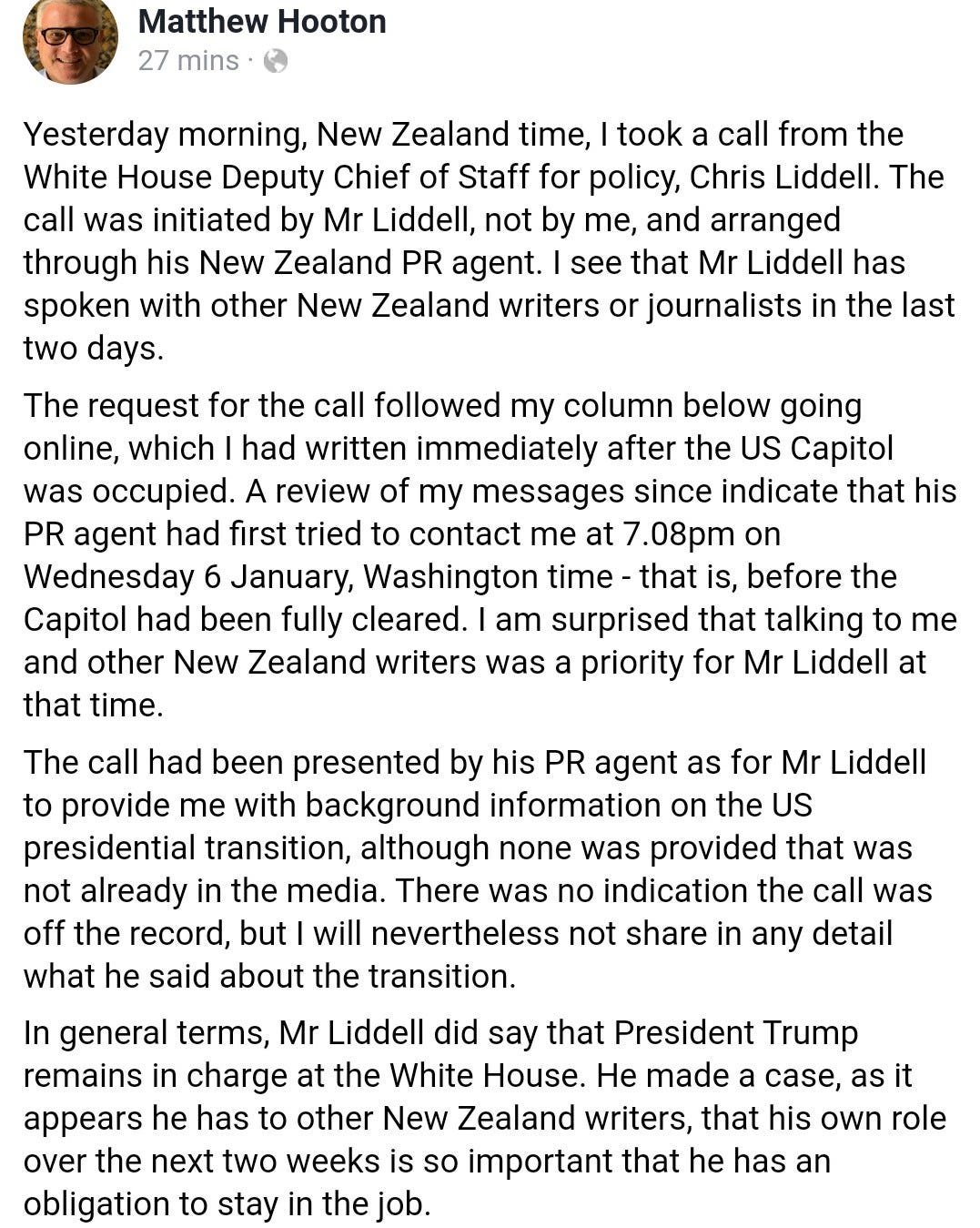
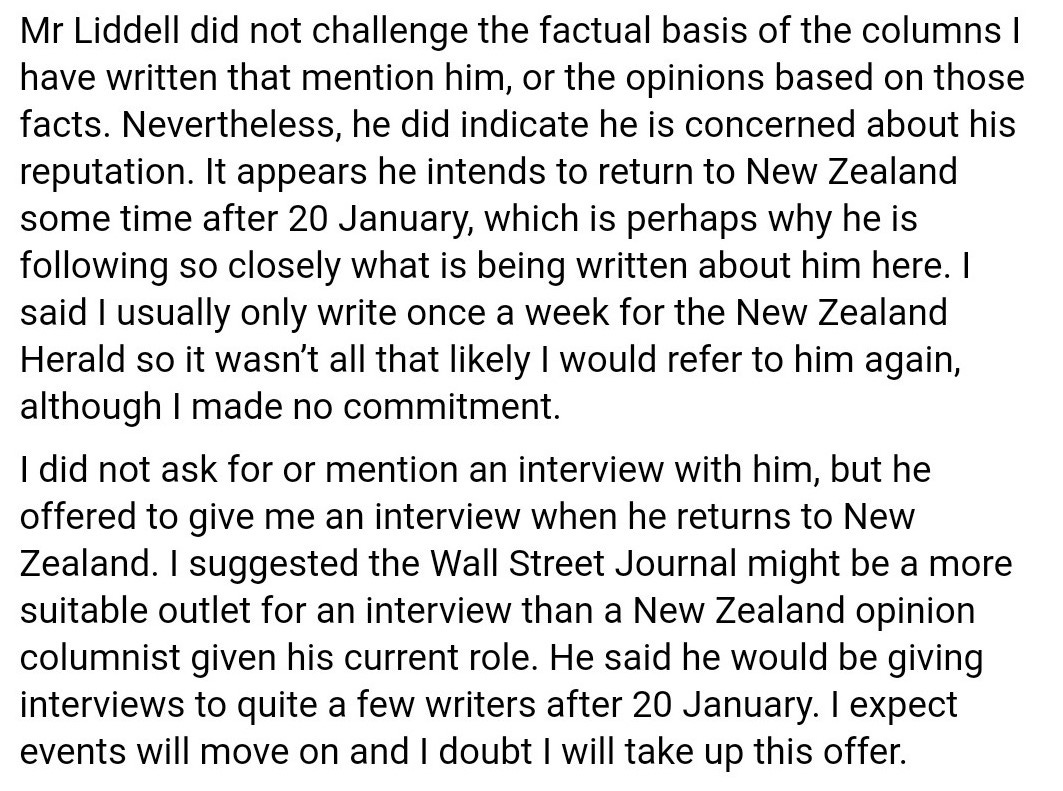
Does this mean that Fran O’Sullivan and Jonathan Milne are writing about Liddell because they’ve been approached by a PR agency? Apparently not. Both say they approached Liddell independently, and there’s no reason not to believe them: he’s a public figure of particular interest, and they are journalists.
Milne has since written “Trump’s man tries to avoid burning bridges,” a follow-up of sorts to his original piece. In this, he indirectly addresses criticism that he didn’t put the hard questions to Liddell: he says he did, and Liddell essentially said “No comment — but only because I’m so very professional, you see.”
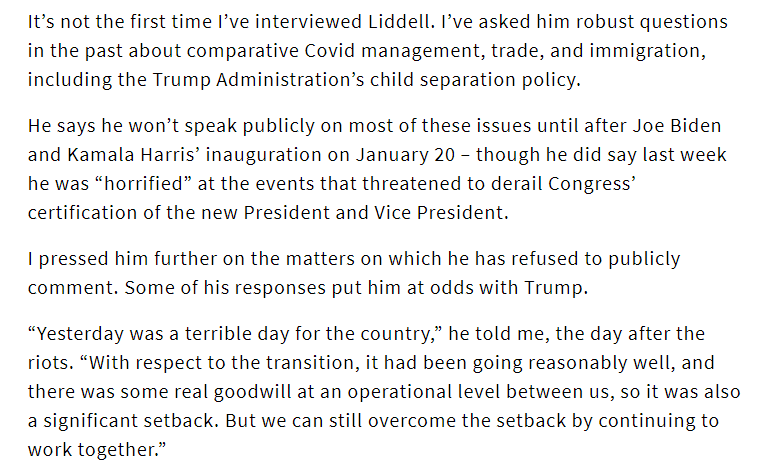
So, that’s the net result: hard questions or not, PR meddling or not: Milne’s piece (and its expansion by way of explanation) still serves Liddell’s agenda, where he’s the hard-done good guy who’s only trying his best to manage a madhouse, and he’d still do a great job at whatever comes next, please and thank you.
Journalists shouldn’t let themselves be used this way. Approaching Liddell upfront only to pen half-news, half-opinion puff pieces that ultimately help polish his tarnished reputation, is, in my opinion, as bad or worse than writing after being approached by a PR agency. They may not mean to, but these publications and journalists are helping this utterly complicit Trump administration official for free.
It doesn’t really matter if they’re not trying to help Liddell, they still are. This reflects appallingly on them. At a time when Trump administration officials are being publicly called out by US journalists and publishers for being complicit in the administration’s endless mendacity, our news media is embarrassing itself. If our journalists can’t manage to hold Liddell to account for his high-ranking role in Trump’s disastrous, criminal administration, then they shouldn’t be writing about him at all. Instead, he should be allowed to sink in disgrace, carried away by his last fastest-flowing river.
This is my first go at this Stubsack thing. If you liked whatever that was, please tell your friends, and annoy your enemies.
